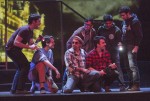Opera UCLA brings Wolfgang Amadeus Mozart and Lorenzo Da Ponte’s classic “Don Giovanni” to UCLA’s Freud Playhouse this Friday and Sunday. Daily Bruin reporter Emma Oeland details the performers’ experience in preparing for the musical work and how relevant it is in today’s art world with Juliana Gondek, a professor of voice and opera studies at UCLA.
–
TRANSCRIPT:
OELAND: Considered the tenth most performed opera worldwide according to Operabase.com, the two-act opera “Don Giovanni,” featuring music by Wolfgang Amadeus Mozart and written by Lorenzo Da Ponte, stands as one of the theater world’s most beloved works. Coming to UCLA’s campus this Friday and Sunday, a selection of students from the UCLA Department of Theater, in collaboration with Opera UCLA and UCLA Philharmonia, will be performing this famed masterpiece at the Freud Playhouse. Juliana Gondek, professor of voice and opera studies at UCLA, explains “Don Giovanni’s” popularity:
GONDEK: It has a special appeal because it tells such a universal story that crosses historic boundaries, class boundaries, political boundaries. It’s a story of power and the abusive power, the imbalance of income, gender inequality, sexual violence, murder, mayhem, redemption. It has all of these universal themes. It’s timeless.
OELAND: Although “Don Giovanni” is historically popular due to its intense storyline and classical music, as chorus member Sarah Saturnino, a second-year vocal performance student explains:
SATURNINO: It’s about a very wealthy man named Don Giovanni who is a complete womanizer. He goes around from town to town using the women and then setting them aside just because he can. At the end of the opera we see him getting dragged into hell for all of his bad deeds.
OELAND: However, how the theater group chooses what opera piece to perform is not based on these factors of story content and music alone:
SATURNINO: Each year we choose an opera based on the voice type that we have, their technical ability, and whether or not we have enough people to fill the roles.
OELAND: Since many of the pieces the opera group chooses to perform are often Western classics from Europe, they are typically performed in the language of the original work’s origin.
SATURNINO: We do have to translate every line and it’s difficult because oftentimes, especially for example German, grammatical context is completely different from English. So if you don’t know the language it is really challenging to figure out what it’s trying to say and most of the time, the text is poetic.
OELAND: Dominic Delzompo, a second-year vocal performance student, plays the role of Masetto, the jealous fiance of the woman that the main character, Don Giovanni, attempts to seduce. He gives his personal account of preparing for a performance that is in a foreign language:
DELZOMPO: This opera is in Italian. … So you take all of your lines and you memorize them obviously but you go through coaching so that you’re pronouncing everything correctly and you’re being true to a language. After that you learn all of the music and everything.
OELAND: While the opera was first performed over 200 hundred years ago, the story, the music and the performance experience itself, are still very relevant and attract many young viewers and performers. Professor Gondek elaborates:
GONDEK: I would say that opera has been steadily gaining in popularity over the past few decades and I believe it something to do with the advent of music videos. I think that started to accustom younger audiences to thinking of music as being something that was also a visual experience. That’s exactly what opera is. Opera is music that is experienced visually as well as orally.
OELAND: From its 1787 debut in Italy, to its 2014 performance at UCLA, Mozart’s operatic masterpiece still holds its original beauty, form and meaning. Whether one’s experience is from behind the curtain, in the orchestra or in the audience, the department theater’s performance of “Don Giovanni” will be a deep appreciation of the original Italian work.
For Daily Bruin Radio, I’m Emma Oeland.
